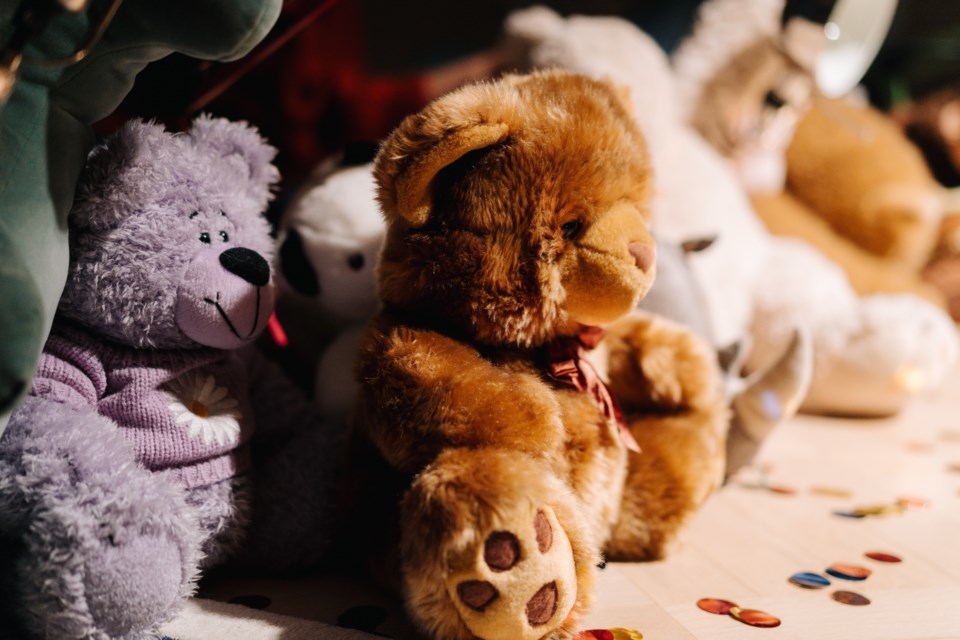Simple acts of kindness can go a long way to comfort people of all ages during times of illness, sadness or distress. It's something Judy Wansbrough learned and shared with others time and again by gifting stuffed animals to sick children and seniors.
“Senior citizens have been shown to adjust better to the stress of intensive care and surgery if they have a teddy,” Wansbrough told reporters in May of 1987 on the eve of the fifth annual Great Teddy Bear Caper festival in Fergus. “These patients can’t communicate, but their loneliness is eased if they can have a teddy bear because it’s a warm cuddly object, which shares their own inability to communicate.”
They were prophetic words given that Wansbrough went on to struggle with grief and loneliness after the death of her beloved husband Lee and would, herself, become unable to communicate later in life after suffering a stroke.
“Both of them were avid collectors of teddy bears,” said physician and friend Barbara Evadne Clunes. “They collected teddy bears from all over the world. Sometimes people think, when you say somebody is a collector, that person, maybe, has a dozen or two or a hundred or so. No, they had about 3,000 teddy bears at last count.”
Lee and Judy Wansbrough founded the Elora-Fergus chapter of Den of the Good Bears of the World, an international organization that collects and distributes teddy bears to sick children, seniors and anyone else that has been traumatized or is simply in need of a soft, comforting embrace.
“Judy and Lee organized and operated Good Bears of the World in Canada,” said Terri Stong executive director of the organization. “Judy was a lifetime member of Good Bears of the World.”
They started the Canadian den in 1987 and distributed thousands of teddy bears over the following 25 years.
“They were very energetic in donating bears for the purpose of bringing children happiness and to people in long-term homes and to children in hospital,” said Clunes. “They also felt that children at certain times would be in a traumatic situation and could be helped by a teddy bear.”
Judy and Lee, who was affectionately known as the Chair Bear, were able to convince local police services to carry teddy bears in their cruisers to calm young victims experiencing trauma. It is a practice that has been adopted by police around the world.
“So, they were able to place teddy bears in the department of the OPP,” said Clunes. “They placed teddy bears in the OPP cars in the area and even a teddy bear in an OPP helicopter, I know that.”
Clunes met the couple 34 years ago and remained a close friend to Judy for the rest of her life.
“It was two years or so after I came to live in Fergus,” Clunes said. “I was treating her husband. So, I met her at that time. I began to take care of both of them through their illnesses. I only knew them on a medical level for a long time. It wasn’t until she became really ill and disabled that I started to be a lot closer with her.”
She remembers them as guarding their privacy but also being a very positive and festive couple.
“They lived a very private life and even though I got to know them, you knew that you didn’t know everything about them,” said Clunes. “Both of them just loved Christmas. I used to be invited to their Christmas parties every year and when you went inside their house, I don’t think I am exaggerating, every inch of the house was decorated.”
Judy worked at the University of Guelph but retired in 2012 shortly after Lee’s death.
“When he died, she was absolutely shattered,” Clunes said. “She grieved for a very long time. She just couldn’t come to grips with it. Some people seem to eventually adapt to loss and grief, but she never did.”
They had no children and had distanced themselves from any extended family.
“During that time her family were this small group of people from the local Anglican Church,” said Clunes. “She was never alone because the nurses or the staff at Caressant Care Nursing Home where she lived, came from their home to visit her even when they were off duty. That just shows you the kind of effect she had on them.”
Nevertheless, declining health prevented Judy from fully enjoying her retirement.
“She wasn’t retired for very long before these chronic illnesses disabled her,” said Clunes. “She had two strokes. They disabled her so she became wheelchair bound. But the really sad thing was that she was unable to converse. She could understand everything you said, and she was just so frustrated trying to join in conversation, but she just could not.”
Judy was able to repeat half a dozen sentences that were usually out of context to the conversation but one of those phrases stood out for Clunes.
“She would say, ‘I can do it,’” Clunes recalled. “That sentence was a real testament to her courage and her grace during intense adversity and frustration. She remained upbeat. She was cheerful.”
Judy’s independence and positivity were infectious to all who knew her.
“From the minute that I met her I recognised that she was a very perceptive person and also very articulate,” said Clunes. “She had very strong opinions and she got herself in trouble sometimes because she had no problem expressing these opinions. In that way she was a character. I would visit her and people would ask me how she was and I would tell them that after the visit, I felt inspired and uplifted. I went there to help her, but I came away feeling better. It was a totally amazing thing.”
Judith “Judy” Louise Wansbrough died Aug. 8, 2021, surrounded by a collection of her favourite teddy bears. She was 74 years old.



.png;w=120;h=80;mode=crop)